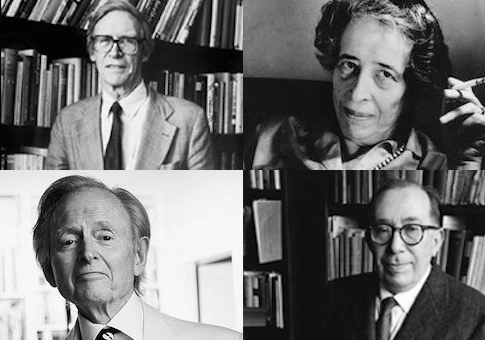The problem with the Age of Search, as opposed to the old Age of Libraries, is that you can no longer find what you weren’t looking for.
From my very first job as a county library page in Burke, Virginia, through long nights spent in my undergraduate college’s library, to yet longer ones at the Oriental Institute Library in graduate school, the greatest pleasure and benefit of being among physical stacks was to go in search of a book only to discover nearby some other volume (or author, or even subject) of which I was totally ignorant—and with which I was instantly fascinated. The possibilities for mental adventure were endless, as was the potential for procrastination. It’s a miracle I ever graduated—just ask my high school guidance counselor—let alone completed a paper.
This thrill of repeated, even assured serendipity, mundane as the process was, formed as important a part of my education as anything else—and it’s next to impossible to replicate with the use of Google or its competitors. Faced with the effectively infinite, unstructured world-mind of data, you have to already know what you are interested in before you embark on your search. And Google, of course, knows what it wants you to be interested in.
A similarly narrowing prospect for the intellectually curious has occurred in the transition from physical newspapers to their Internet versions. Now, I tend only to click on the links for stories that already interest me. In the past, browsing through the newsprint, I was much more inclined to start giving a read to something—say, political unrest in Nepal, or trouble with teachers’ unions in Seattle—that has little obvious impact on my own life, and very frequently discovered that it was something I should know more about. The computing revolution has been good for many things, but in this respect we are worse off today than we were 20 years ago.
On one of the pages devoted to Seth Benardete on the new website contemporarythinkers.org, Professor Mark Blitz relates the following quip from a book of conversations between Benardete and some of his students:
There’s a joke that goes: "‘Do you know where we’re supposed to go?’ I said, ‘No.’ So he said, ‘Well let’s go together.’ That’s how we met."
Blitz describes this anecdote as "an all-purpose metaphor for youth, love, education, friendship, and thought," but discovering it where I did, it put me in mind of the way a well-curated library itself can be a friend. Contemporary Thinkers, a project of the Foundation for Constitutional Government, is certainly well curated, and a delightful example of the Internet being shaped to friendly, humane ends.
The idea is not flashy: a series of pages devoted to writers, scholars, and intellectuals who have made major contributions to our public conversation in the past century or so. There is a useful sister site, devoted to the "Great Thinkers" of whom you’ve heard—Plato and his footnotes—but something about Contemporary Thinkers seems more needful.
For the new site, there are 30 pages right now—including pages devoted to Hannah Arendt, John Rawls, Leo Strauss, Samuel Huntington, Michel Foucault, and Lionel Trilling—and a promise of more to come. The appeal is in the comprehensiveness of every thinker’s page, each of which provides a complete bibliography with links to texts in the public domain (and links to where texts can be purchased, for those not available for free) along with introductory essays, selected commentary, and some interesting multimedia options (see, for example, Huntington briefly debate Francis Fukuyama in the early ’90s on the Clash of Civilizations versus the End of History.)
There is a lot of human sweat soaked into these fine pages. Accurate bibliographies and working links like these cannot be assembled and maintained by "crowdsourcing." If you want to test that proposition, compare the Wikipedia page for any of these authors with what’s available at Contemporary Thinkers. By far the best aspect of the site is the central role of primary sources—this really is a virtual library of these thinkers’ work, built for browsing, much more than it is an encyclopedia where interpretive commentary plays the lead role. And should one of the subjects have other good websites already devoted to them, Contemporary Thinkers rather generously provides the link, so that one can spend hours (days? weeks?) nosing around, say, audio recordings of Strauss’s classes at the University of Chicago in the ’50s and ’60s.
I expect that the question of the canon on this website is tied to labor as much as anything else—finding knowledgeable, careful sorts available to do the curatorial work. There is tremendous room for expansion beyond the founding 30 entries. In an introductory video for the site, Christopher DeMuth mentions a page for Charles Murray, which I see is not yet online, so there’s that to look forward to.
And where beyond? There’s a page for Tom Wolfe, but not yet one for Saul Bellow. Among economists, Keynes and Hayek are represented, but not Milton Friedman. With his recent Big Book on the nature of political order, Fukuyama himself probably deserves inclusion, if he didn’t already for The End of History and the Last Man—and while we’re at it, why not a page for Alexandre Kojève? And, let’s be honest, curators—with Benardete, we’re gently skirting the implicit "politically engaged" criterion, aren’t we? So why not get Jacob Klein and even Eva Brann in there, too? Christopher Hitchens—no man was more engaged, but was he forever too occasional?
It’s fun to consider the possibilities. It’s even more fun to browse the digital stacks of Contemporary Thinkers. Give it a try, and discover what you didn’t even know you were interested in.
